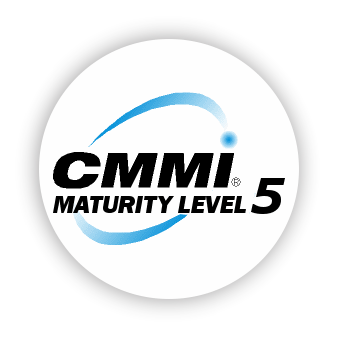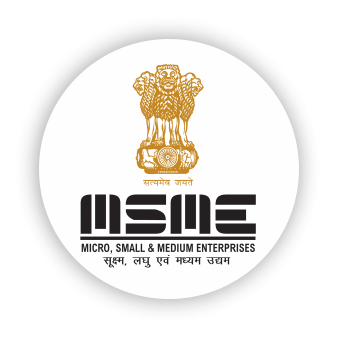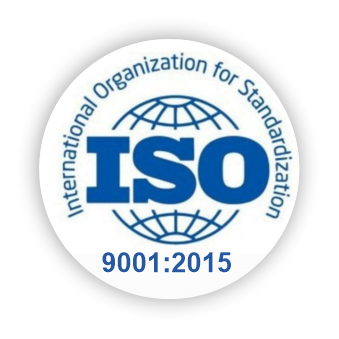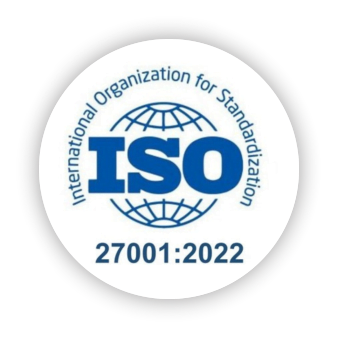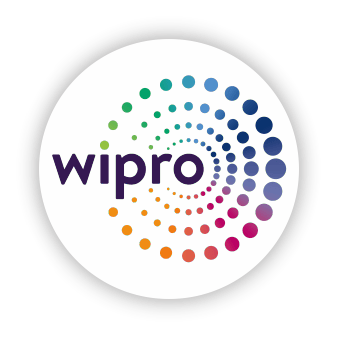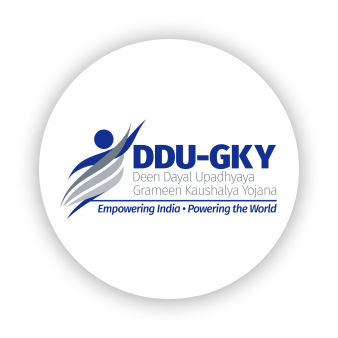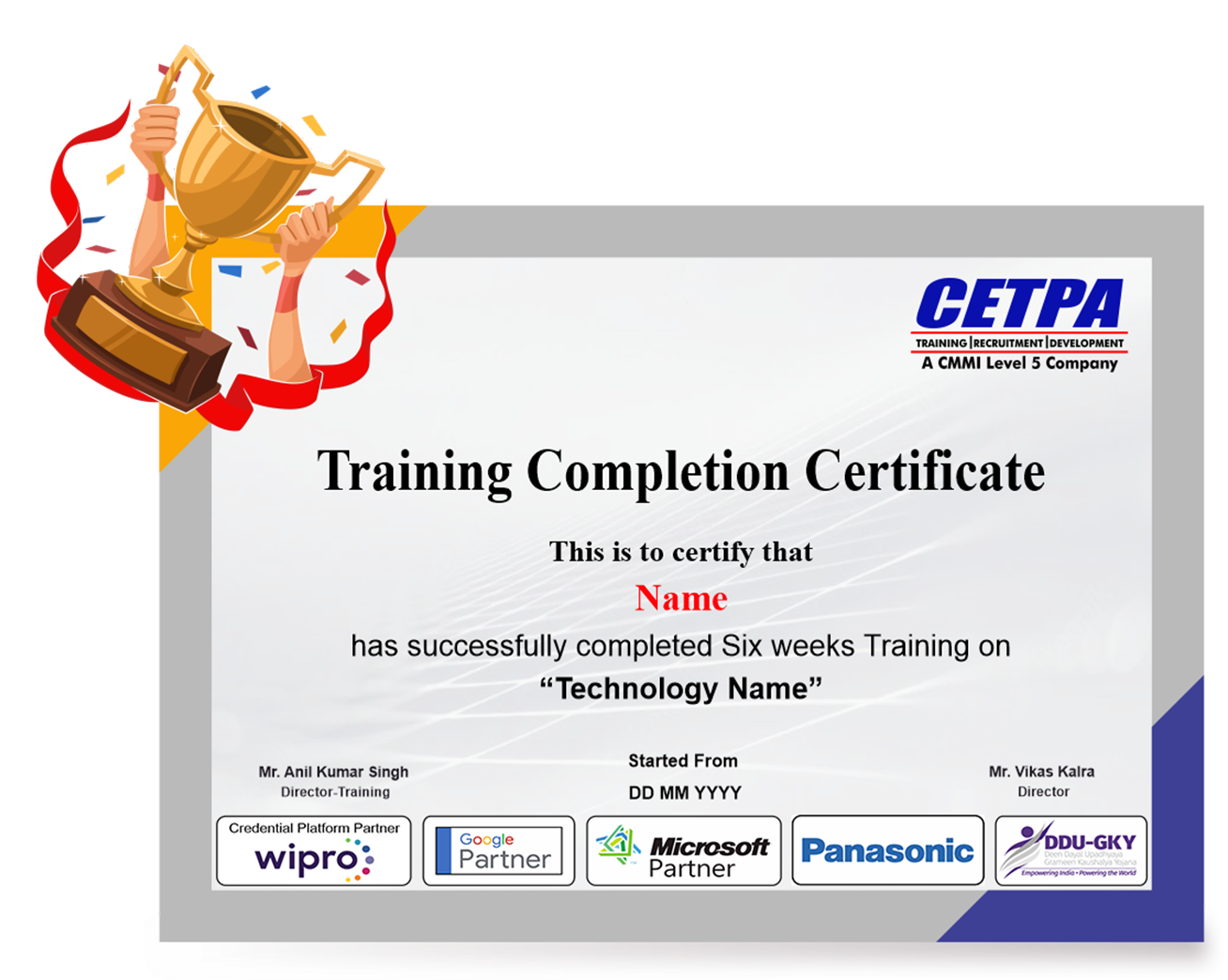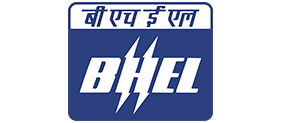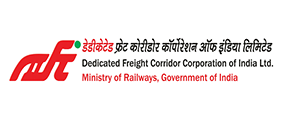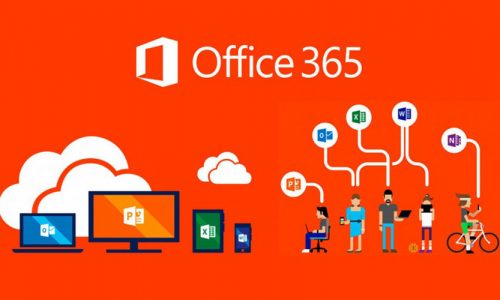Oracle Developer Certification Training
Discover the depths of Oracle Technology. Join us now to gain comprehensive insights into Oracle technology from a seasoned professional.
![]() 5 out of 5 based on 101 user reviews. |
5 out of 5 based on 101 user reviews. |  |
|  |
|  |
| 
Enquire Now
Accreditations & Affiliations
Training Features
Best Oracle Developer Training Institute in Delhi NCR
Join Best Oracle Developer Online Training in Delhi, Oracle Developer Online Training Course in Delhi, Oracle Developer Online Training Institute in Noida
CETPA INFOTECH is the best Oracle developer training institute in Delhi NCR.Oracle developer Training is primarily meant for designing and implementing database applications. Oracle Developer responsibilities can be summarized as follows:-
- Designing and developing the database application.
- Designing the database structure for an application.
- Estimating storage requirements for an application.
- Specifying modifications of the database structure for an application.
- Relaying the above information to a database administrator.
- Establishing an application's security measures during development.
CETPA provides internationally certified Oracle developer Training in association with Oracle.It is the best oracle developer training in Delhi NCR. Oracle Corporation is a multinational computer technology corporation, headquartered in California which specializes primarily in developing and marketing database software and technology, cloud engineered systems and enterprise software products — particularly its own brands of database management systems.
In the early 1990s, Oracle had two complementary, but quite different tools - SQL*Forms and SQL*Report Writer. Both were character- based and there was some integration between the two although they were sold as separate products. The developer interface became more similar over time and they were eventually grouped together as Oracle IDE (Integrated Development Environment). The suite was renamed to Oracle Developer and then to Oracle Developer/2000.
As with most of the products that had 2000 in their name, 2000 was dropped from Oracle Developer after 1999 and the suite was renamed Oracle Developer Suite. Tools such as Oracle Designer were added over subsequent years. Most of the component parts of Oracle Developer Suite are now part of what Oracle calls Oracle Fusion Middleware.
- 1977 : Larry Ellison and his two friends founded SDL labs.
- 1978-1985 : Oracle Version 1-5 with features which supported Client server and Read consistency was launched.
- 2000 : Oracle e-business suite 11i pioneers were launched.
- 2006 : Oracle announces Unbreakable Linux and acquires i-flex.
- 2011 : Oracle Corporation acquires web content management system and also acquires Endeca technologies.
- 2013 : Oracle Corporation releases Oracle Database for Linux, Solaris and windows.
The future for Oracle developers is great right now! Oracle technology has been hot for the past 15-20 years and still is. Companies are on the lookout for students who opt for Oracle developer training.
Regardless of your industry or database system specialization, database administration is a high-demand profession offering top-tier earning potential and significant opportunities for upward mobility. Start on your path to a lucrative database administrator salary today; browse CETPA directory of Oracle developer training and degree programs and connect with a counsellor to build your ideal learning plan. Database administrator salaries are among the highest base salaries in IT, and experienced DBAs and database team leaders can earn salaries well into the six-figure range.
An Oracle developer is more of a business analyst / software developer, it is concerned with planning and designing a database whose structure meets the user’s current and future needs for data storage and reporting.
Oracle Developer Training is a fundamental course for candidates willing to make their careers in the field of Oracle Database administrator. Oracle Developer Training covers basics of Structured Query Language (SQL), Basic of PL/SQL, 10g Administration-I and 10g Administration-II. After completing Oracle Developer Training, candidates can apply for OCA And OCP examination. There is a huge requirement of Oracle developer in market of India as well as in foreign countries.
CETPA InfoTech Private Ltd. is a training company, which is located in Noida (Delhi NCR), Roorkee, , Dehradun and Lucknow. CETPA is an authorized partner of Oracle and its goal is to provide the best quality education and knowledge beyond books and boundaries. Oracle developer training is the most promising field for freshers. Learn, manage and become a professional database administrator with CETPA as it provides in-depth Oracle Developer training. Oracle developer certification will benefit you in many ways. Few benefits are:
- Turn into more specialized technologist.
- Provide you with new skills and understanding to yield you the position of specialized expert in international IT industry.
- With learning to implement, develop and administer critical system.
- Widen up your career opportunities.
- Develops a new sense of confidence in your technical abilities.
With Oracle Developer Training, normally BCA / MCA or B.E / B.tech/ M. tech students can find opportunities as Software engineers in reputed companies to manage various database related projects. CETPA offers 4/6 weeks or 6 months Oracle Developer Training program to expertise the trainee skills and offer them with certification. We also offer vocational training to students so that they can have the advanced learning of Technology.
The features that differentiate the CETPA from other training schools are:- Live virtual classes main aim is to benefit NRI students and long distance students.
- 100% student’s satisfaction based training.
- CETPA’S training centres are equipped with good lab facilities and excellent infrastructure.
- Experts and experienced Oracle certified professionals with hands on real-time multiple Oracle based projects.
- CETPA also offer the certified materials and certification syllabus coverage.
- Dedicated placement cell along with excellent placement record.
CETPA also offer foreigner students and professionals with short-term courses and internship program to benefit them with the learning of technology and augment technical as well as practical knowledge.
Oracle Applications are in great demand across the country and around the world in almost every industry. Organizations of all sizes are seeking oracle developers and database administrators to help them launch new projects and managing existing data sets. Few companies hiring Oracle developer are:
- Oracle
- JP Morgan
- HP
- Wipro
- Xtranet Technologies Pvt. Ltd.
- Cognizant
- Diverse Lynx and many more companies.
CETPA always believes in tuning candidate profile according to industries varying demand. Our real time Oracle experts aware of this and can mould students into skilled oracle developer experts with international certification weightage level. Join CETPA industrial training and increase the placement opportunity in Oracle Developer profile immediately after the completion of the course with us. We have trained more than 300+ oracle developer students and provided placement to them. The students of CETPA get good opportunities to prove themselves in the placements. Some of the reflections of the placement can be observed in the table mentioned below:
CETPA trains student to be Industry ready and this is reflected in our placements. Students willing to bag a good and exciting career can join CETPA for an exciting experience. For a countless number of placements from CETPA please Click Here.
- You will get better knowledge of programming and how to implement it for actual development requirements in the industrial projects and applications.
- Enhanced knowledge on the web development framework. Using this framework, you can develop dynamic websites swiftly.
- You will learn how to design, develop, test, support and deploy desktop, custom web, and mobile applications.
- Design and improve testing and maintenance activities and procedures.
- Design, implement and develop important applications in a Oracle Developer environment.
- Increased chances of working in leading software companies like Infosys, Wipro, Amazon, TCS, IBM and many more.
Professional growth, increased compensation and validation of the skill are the most popular reasons why individuals and professionals seek IT certifications. Keeping this in mind, we at CETPA provide you with certification in latest and innovative technologies to help you to reach your certification goals.
CETPA is the official Training partner of Oracle, Microsoft, Autodesk, Panasonic and Nuvoton and thus provides Training as per international standards and curriculum. CETPA proudly provides you certification in association with our training partners so that you can validate your domain specific technical skills. Certification from these big brands will help you in grabbing your dream job.
- Gives you an advantage while searching for a job and provide a competitive advantage over your competitors.
- Ensure knowledge and skill are up to date and can be applied to the job
- Provide credibility to those looking for a career in an IT domain.
- Offer fast track to career advancement
- Demonstrate level of competency
- Professional Credibility as well as it demonstrates your dedication and motivation to professional development.
- You are likely to stand out from the crowd and be considered to be successful in your positions.
- Represent a well-recognized and valued IT credential that increases marketability and competitive edge.
- Provide peace of mind with the confidence that certified employees have truly learned the skills necessary to do their jobs;
- Express valuable credentials to search for in prospective employees, and can help retain top performers when offered as an incentive;
- Offer a competitive advantage when the team is trained and certified regularly.
Talk To Advisor
MODE/SCHEDULE OF TRAINING:
| Delivery Mode | Location | Course Duration | Schedule (New Batch Starting) |
|---|---|---|---|
| Classroom Training (Regular/ Weekend Batch) | *Noida/ *Roorkee/ *Dehradun | 4/6/12/24 Weeks | New Batch Wednesday/ Saturday |
| *Instructor-Led Online Training | Online | 40/60 Hours | Every Saturday or as per the need |
| *Virtual Online Training | Online | 40/60 Hours | 24x7 Anytime |
| College Campus Training | India or Abroad | 40/60 Hours | As per Client’s need |
| Corporate Training (Fly-a-Trainer) | Training in India or Abroad | As per need | Customized Course Schedule |
Course Content
- Retrieving Data Using the SQL SELECTStatement
- List the capabilities of SQL SELECT statements
- Execute a basic SELECT statement
- Restricting and Sorting Data
- Limit the rows that are retrieved by a query
- Sort the rows that are retrieved by a query
- Use ampersand substitution to restrict and sort output at runtime
- Using Single-Row Functions to Customize Output
- Describe various types of functions available in SQL
- Use character, number, and date functions in SELECT statements
- Using Conversion Functions and Conditional Expressions
- Describe various types of conversion functions that are available in SQL
- Use the TO_CHAR, TO_NUMBER, and TO_DATE conversion functions
- Apply conditional expressions in a SELECT statement
- Reporting Aggregated Data Using the Group Functions
- Identify the available group functions
- Describe the use of group functions
- Group data by using the GROUP BY clause
- Include or exclude grouped rows by using the HAVING clause
- Displaying Data from Multiple Tables
- Write SELECT statements to access data from more than one table using equijoins and nonequijoins
- Join a table to itself by using a self-join
- View data that generally does not meet a join condition by using outer joins
- Generate a Cartesian product of all rows from two or more tables
- Introduction to PL/SQL
- Explain the need for PL/SQL
- Explain the benefits of PL/SQL
- Identify the different types of PL/SQL blocks
- Output messages in PL/SQL
- Declaring PL/SQL Variables
- Recognize valid and invalid identifiers
- List the uses of variables, declare and initialize variables, use bind variables
- List and describe various data types using the %TYPE attribute
- Writing Executable Statements
- Identify lexical units in a PL/SQL block
- Use built-in SQL functions in PL/SQL and sequences in PL/SQL expressions
- Write nested blocks and qualify variables with labels
- Write readable code with appropriate indentation
- Interacting with the Oracle Database Server
- Create PL/SQL executable blocks using DML and transaction control statements
- Make use of the INTO clause to hold the values returned by a SQL statement
- Writing Control Structures
- Identify the uses and types of control structures(IF, CASE statements and expressions)
- Construct and identify loop statements
- Working with Composite Data Types
- Create user-defined PL/SQL records
- Create a record with the %ROWTYPE attribute
- Create an INDEX BY table and INDEX BY table of records
- Describe the differences among records, tables,and tables of records
- Using Explicit Cursors
- Distinguish between usage of implicit andexplicit cursors
- Declare and control explicit cursors, use simpleloops and cursor FOR loops to fetch data
- Declare and use cursors with parameters CETPA INFOTECH PVT. LTD.CURRICULUM OF ORACLE DEVELOPER
- Using Subqueries to Solve Queries
- Define subqueries
- Describe the types of problems that the subqueries can solve
- List the types of subqueries Write single-row and multiple-row subqueries
- Using the Set Operators
- Describe set operators
- Use a set operator to combine multiple queries into a single query
- Control the order of rows returned
- Manipulating Data
- Describe each data manipulation language (DML) statement
- Insert rows into a table
- Update rows in a table
- Delete rows from a table
- Control transactions
- Using DDL Statements to Create and Manage Tables
- Categorize the main database objects
- Review the table structure
- List the data types that are available for columns
- Create a simple table
- Explain how constraints are created at the time of table creation
- Describe how schema objects work
- Creating Other Schema Objects
- Create simple and complex views
- Retrieve data from views
- Create, maintain, and use sequences
- Create and maintain indexes
- Create private and public synonyms
- Creating Packages
- Identify the benefits and the components of packages
- Work with packages (create package specification and body, invoke package subprograms, remove a package and display package information)
- Working with Packages
- Overload package subprograms
- Using the BULK COLLECT and FORALL statements
- Use of NOCOPY
- Lock rows with the FOR UPDATE clause and reference the current row with the WHERE CURRENT OF clause
- Handling Exceptions
- Define PL/SQL exceptions
- Recognize unhandled exceptions
- Handle different types of exceptions (predefined exceptions, non-predefined exceptions and user-defined exceptions)
- Creating Procedures
- Create a simple procedure and invoke it from an anonymous block
- Work with procedures
- Handle exceptions in procedures, remove a procedure, and display a procedure's information
- Creating Functions
- Differentiate between a procedure and a function
- Describe the uses of functions
- Work with functions (create, invoke and remove functions)
- Navigation
- Transaction Processing
- Writing Flexible Code
- Sharing Objects and Code
- Introducing Multiple Form Applications
- Creating a Menu Module
- Managing Menu Modules
- Building Multiple Form Applications
- Working with Record Groups
- Using Database Objects in Forms Applications
- Using Dynamic SQL
- Creating Triggers
- Describe different types of triggers and their uses
- Create database triggers
- Manage triggers
- Creating DML, DDL, and Event Database Triggers
- Create triggers on DDL statements
- Create triggers on system events
- Hide PL/SQL source code using Wrap utility
- Introduction to Oracle Forms
- Developer and Oracle Forms Services
- Running a Forms Developer Application
- Working in the Forms Developer Environment
- Creating a Basic Form Module
- Working with Data Blocks and Frames
- Working with Text Items
- Creating LOVs and Editors
- Creating Additional Input Items
- Creating Non-input Items
- Creating Windows and Content Canvases
- Working with Other Canvas Types
- Introduction to Triggers
- Producing Triggers
- Debugging Triggers
- Adding Functionality to Items
- Run Time Messages and Alerts
- Query Triggers Validation
- Introduction To Reports
- Types Of Reports
- Working With Reports
- Using Different report builder components
- Creating Report Through Wizard
- Modifying Report Through Wizard
- Creating Report Manually
- Report With Simple Data Model
- Data Model Groups
- Place Holder
- Using Summary columns at Group and Report Level
- Formula Columns
- Adding Page Numbers And Logo
- Conditional Formatting
- Layout Objects
- Building A Matrix Layout / Crosstab Report
- Report With Simple Parameter Form
- Bind Parameters
- Lexical Parameter
- Report Triggers And Their Sequence
- Format Trigger
Our Process

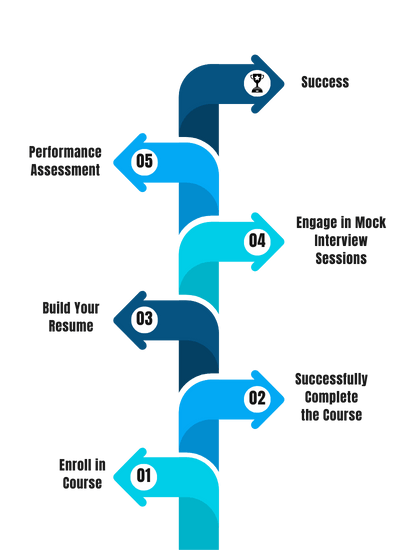
FAQ'S
- Classroom Training
- Online Training
- Corporate Training
- On campus Training
Career Assistance
- Build an Impressive Resume
- Attend Mock-Up Interviews with Experts
- Get Interviews & Get Hired
Training Certification
Earn your certificate
Your certificate and skills are vital to the extent of jump-starting your career and giving you a chance to compete in a global space.
Share your achievement
Talk about it on Linkedin, Twitter, Facebook, boost your resume or frame it- tell your friend and colleagues about it.
Upcoming Batches
What People Say
Our Partners
Need Customized Curriculum? Request Now
Structure your learning and get a certificate to prove it.

Our Clients
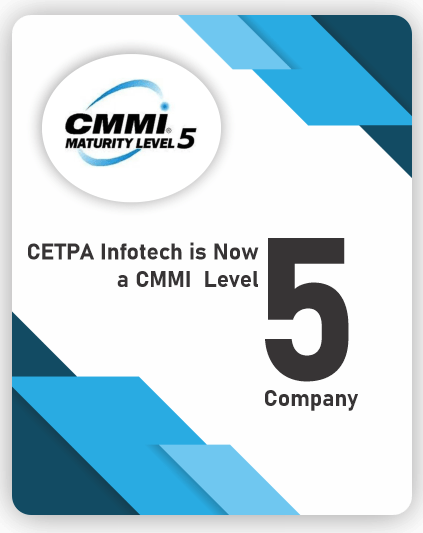
Our Placed Students
Related Courses
Review Us
Lavanya Malhotra
![]() Monday, 17 April 2017
Monday, 17 April 2017
Oracle Developer Training In Noida
My friend recommended me to join CETPA for Oracle Developer Training. When I joined CETPA I was delighted to see trainers use both theoretical as well as practical teaching methodology to assist me in completing my live project. Keep up the good work!
Course Features
- Lectures 0
- Quizzes 0
- Duration 10 weeks
- Skill level All levels
- Language English
- Students 0
- Assessments Yes



